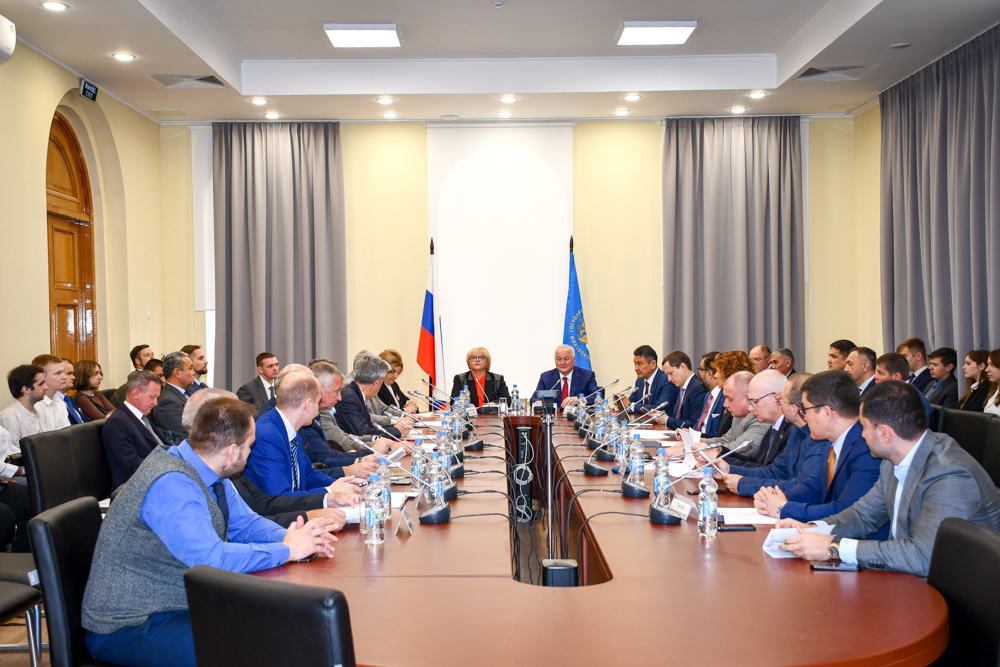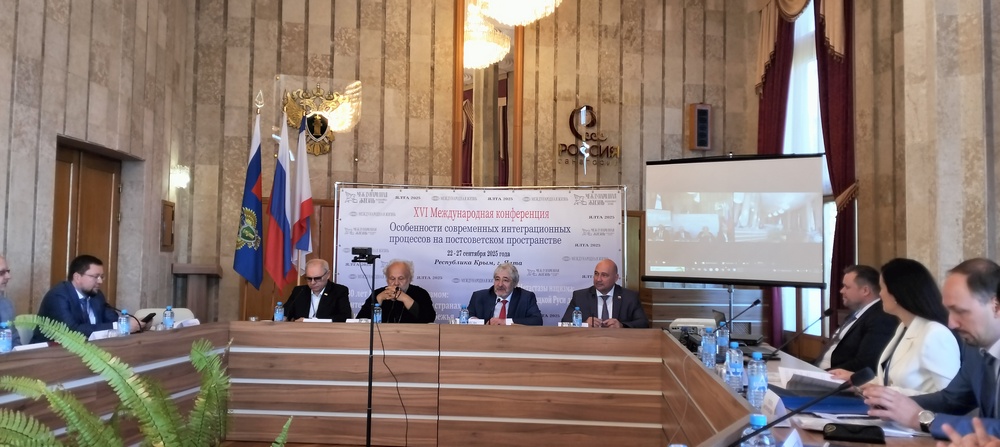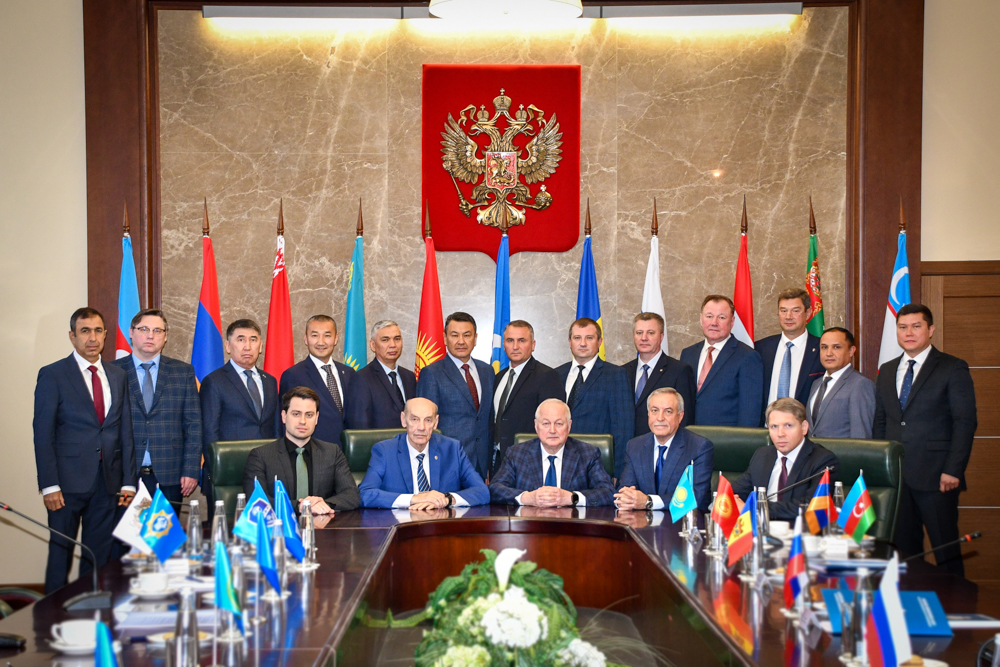September 3, 2018

The Head of CIS Anti-Terrorism Center made a statement at the conference on Countering Illicit Arms Trafficking in the Context of Fighting International Terrorism organized with the support of the Russian Foreign Ministry. The conference brought together representatives of more than 20 countries and 11 international organizations.
In his statement the CIS ATC Head noted that according to expert estomates the illicit arms trade market is about 2.5 bln. USD. The super-profitablity of illicit arms trafficking not only attracts representatives of criminal structures to this type of criminal business, but it also forces many countries to turn a blind eye to the their international obligations and actually legalize such supplies, - he stressed.
Andrey Novikov added that this segment of ordinary crime poses the greatest threat to public security of the Commonwealth states and emphasised that the Commonwealth states demostrate a responsible approach to solving the indicated problems, including the one in the legal framework.
According to CIS ATC Head, the legal instruments adopted within the CIS, including the Concept of a Unified System for Information Marking of Explosives, Ammunition and Firearms of the CIS member-states and the Agreement on Cooperation in Combating the Illicit Manufacturing and Trafficking in Firearms, Ammunition, Explosives and Explosive Devices faciliate control over the market of illicit arms trafficking.
Statement of the Head of the CIS Anti-Terrorism Center Colonel-General of Police Novikov A.P. at the International Conference on Countering Illicit Arms Trafficking in the Context of Fighting International Terrorism
In recent years, there is an evident tendency of combining extremely dangerous criminal strata - international terrorism and transnational crime. Illicit trafficking in firearms, ammunition, military equipment and explosives is very important part of transnational crime structure.
Zones of armed conflicts became a real Klondike for the illegal arms business. The sources of weapons there are military arsenals, illegal production, and organized contraband. To ensure illusion of transactions legality, corrupt officials and international arms brokers are involved to supply to illegal armed groups, extremist and terrorist groups, especially in the countries where arms embargo is imposed.
According to expert estimates, the market for illicit arms trade including heavy weapons and tanks is about 2.5 bln. US dollars. The super-profitability of illicit arms trafficking not only attracts representatives of criminal structures to this type of criminal business, but also it forces many countries to turn a blind eye to their international obligations and actually legalize such supplies.
The development of information and communication technologies makes a significant contribution to the expansion of the shadow arms market. The so-called darknet has greatly simplified the work of arms dealers, providing a safe platform for trading arms, ammunition, and distribution of the instructions for their artisanal production. While organized illegal arms deliveries through unconscientious states are focused on international terrorism, the darknet rather considers self-radicalized lone wolves as buyers. In this regard, it is worth recalling the Munich tragedy of July 22, 2016, when an 18-year-old Iranian native opened fire on visitors of the McDonald's restaurant with the weapon he acquired through the darknet. Such logistics is relatively new for law enforcement agencies and, undoubtedly, requires modernization of investigative techniques in peer-to-peer networks.
The security and law enforcement agencies of the CIS member-states considered the problems of illicit arms trafficking both in the context of countering conventional crime and in connection with the high probability of using such arms in terrorist attack preparation and commitment.
Statistics that over the last 3-4 years the dynamics of these crimes registered in the Commonwealth countries tend to grow, though the growth rate is moderate. In 2014 in the CIS 31 thousand (31,299) crimes connected with illicit arms trafficking were registered, while in 2017, this figure stood at 33 thousand (33,248). The annual increase is 2-3%.
At the same time, based on information received from the partners, we come to the conclusion that illegal arms market, traditionally popular among criminals, is now actively used not only by lone wolves, but also by the members of sleeper cells formed of returning foreign terrorist-fighters in the CIS countries. And this is a much more dangerous aspect of the problem. In the process of preparation for terrorist attacks, members of sleeper cells search for the tools of its commitment, primarily firearms and explosive devices. And among others, one of the sources of their supply is the market of civilian weapon converted into a military weapon by handicraft.
There are cases of armed attack on arms stores in order to steal weapons for later use in terrorist attacks on critical targets, as happened in June 2016 in Aktobe, Republic of Kazakhstan.
In addition, we record an increase in the segment of firearms manufactured on the basis of civilian weapons and the so-called full-scale mockups, certain components of which are identical to combat arms. Increasingly, security and law enforcement agencies are conducting operations to eliminate clandestine workshops for manufacture and modernization of weapons and ammunition. So, in May of this year, clandestine workshops were eliminated in the Tver, Moscow, Novgorod regions of Russia. At the end of July, a clandestine workshop for weapons production was discovered in a private residence in Cherkessk.
In the structure of crimes registered in the CIS states, illicit arms trafficking is from 2 to 4%. It seems that their share is not so great. However, this segment of ordinary crime is one of the most important indicators of possible terrorist activity and it poses the greatest threat to public security.
For the Central Asian region, activity of international terrorist organizations based at the southern border and ready to implement the plans to expand their area of influence contributing to the growth of demand for firearms is the most dangerous. As the Security Council of the Russian Federation rightly noted, the problem of insufficient legal support is evident in assessing the efforts of the international community to counter transnational crime. The provisions of international instruments and conventions designed to regulate relations in the field of combating international crime are only partially fulfilled. No sanctions for the non-fulfillment are provided.
In this regard, the countries of the Commonwealth demonstrate a responsible approach to solving the indicated problems, including the one in the legal framework. The CIS Inter-Parliamentary Assembly adopted a number of specialized normative acts aimed at countering illegal trafficking in firearms and ammunition. It is the Concept of a Unified System for Information Marking of Explosives, Ammunition and Firearms approved on June 3, 2005 by the decision of the Council of Heads of CIS Governments, and the Agreement on Cooperation in Combating the Illicit Manufacturing and Trafficking in Firearms, Ammunition, Explosives and Explosive Devices, signed by the Heads of CIS Governments on November 14, 2008. The CIS Anti-Terrorism Center took an active part in their elaboration. The legal instruments together with the sources of national legislation provide the CIS states with a real opportunity to control illicit arms trafficking and consequently the security of citizens.
Activity of the security, intelligence and law enforcement agencies of the CIS member-states in countering illegal supply of arms in the context of fighting international terrorism is premised on the following main principles:
improvement and development of model normative acts and special cooperation programs that provide the most effective methods of combating international terrorism, preventing and suppressing of crimes related to illicit arms trafficking;
developing, aligning and implementing joint coordinated measures aimed at preventing organized illicit arms trafficking, including preventive and search measures;
support and expansion of the interstate exchange of information on the facts of illicit arms trafficking and persons who committed crimes of this type;
organization of advanced training of counter-terrorist units officers whose official activities are directly related to countering illicit arms trafficking, including through operational search activities and preliminary investigation.
All these principles are implemented as a priority by the CIS Anti-Terrorism Center together with the competent authorities of partner countries, including with the support of foreign ministries where necessary.




